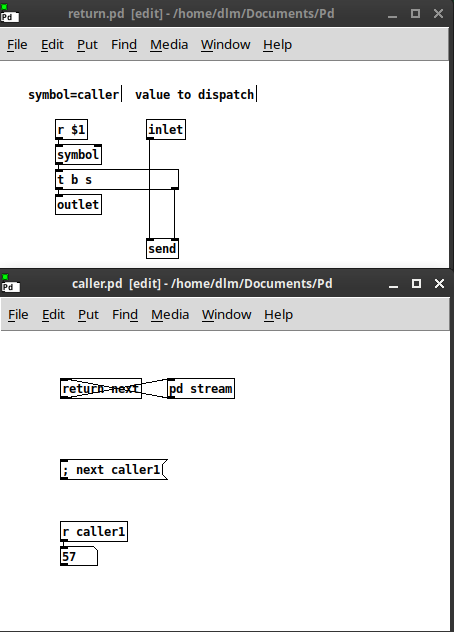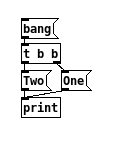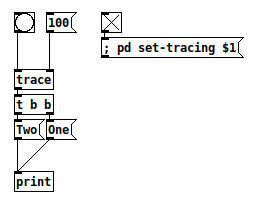for now it's just quite abstract and over my head
I made a concrete example -- with scores!  If the programming-ese terminology is too difficult, maybe focus on that example.
If the programming-ese terminology is too difficult, maybe focus on that example.
I hear that it's impossible to do something "x", or too hard, and I hear about complex programming paradigms, and then it comes down to a simple solution like using [value].
That's a good point. Sometimes it takes effort to find the simplest way.
I don't think extending pd would solve this issue
Yeah, the core of the issue is that Pd's stack works differently from most text languages since Fortran.
Tbh I think variable-target [send] is fine, once it's been established that [send] is going to be involved in pretty much any Pd solution. "Return to caller" as in any structured or object-oriented language is nicer, but [send] is not bad.
what I think @ddw_music refers to as "spray everywhere,"
Here, I'm referring specifically to https://forum.pdpatchrepo.info/topic/15085/return-to-caller-followup-from-symbols-explicit/8 , where the [send] pushes the value out to all matching receivers -- to every potential caller -- where it's swallowed by an [f]'s cold inlet, and only the specific caller pushes the value forward. If you have 50 potential callers, then the data have to be replicated 50 times.
If the data are sub-lists instead of single floats, that would be a lot of multiple allocation. My/jameslo's solution doesn't do that; nor does yours.
to get the equivalent of abstractions calling abstractions would require you to fill your abstractions with [v ]s and [send]s and [receives]s in the vain attempt to cover every possible situation
[list-map] in list-abs shows a nice approach, though, decoupling the iteration logic from the user-operation: the abstraction outputs a trigger to perform the operation, and then the result of that operation is put back into the abstraction to finish the job. That could inspire a super-minimalist approach (which has the benefit of assuming nothing about the returned value's type, whereas most other solutions posted here seem to assume it will always be a single float):

Now, I didn't think of this until the discussion went through a few iterations... see porres's comment about the eventual solution often being much simpler than the problem seems at first.
hjh





 They're structured, provide a convenient way for exiting deeply nested loops, and feel similar to Java's exception framework.
They're structured, provide a convenient way for exiting deeply nested loops, and feel similar to Java's exception framework.